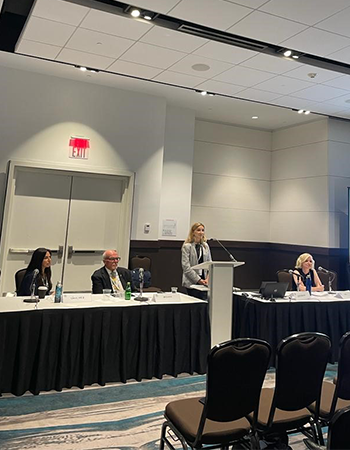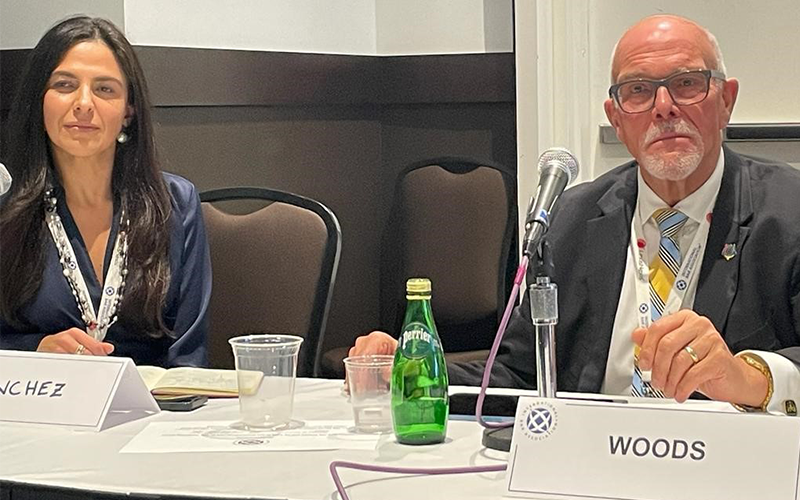IBA Access to Justice and Legal Aid Committee: 2022 Annual Conference report
Wednesday 21 June 2023
Louise Grosos
Laurent Cohen-Tanugi Avocats, Paris
louise.grosos@gmail.com
Introduction
Climate change is a ‘common concern of humankind’, in the words of the Paris Agreement [1]. Nations from around the world have faced more intense climate events than ever in recent years, from fires in Australia, to droughts in Europe, or floods in Pakistan so severe that they have been called ‘biblical’[2]. While all countries have been impacted by climate events, studies have shown that developing countries are being hit the hardest [3], and within them, vulnerable communities and individuals.[4] Those communities and individuals are often the ones with the fewest resources and pathways to access justice.
Facing this great imbalance, the legal profession has a responsibility to ensure that ‘no one is left behind’ to achieve climate justice. The IBA has been active in addressing this inequality, through – among other things – providing leadership in the global legal response to climate change and promoting climate justice, especially through the IBA Access to Justice and Legal Aid Committee (the ‘Committee’). The Committee’s session at the 2022 IBA Annual Conference in Miami focused on access to climate change justice for the world’s most vulnerable citizens. It was an honour to have been awarded with this Committee’s scholarship for an important session on climate justice.
IBA Access to Justice and Legal Aid Committee
The Committee, which is part of the IBA Section on Public and Professional Interest, aims to identify barriers to access and find solutions for overcoming them. In particular, the Committee puts an emphasis on legal aid, and shares its findings in reports and events. The Committee is currently co-chaired by Anne-Marie Blaney and Heike Loercher.
IBA Annual Conference session: Access to climate change justice for our most vulnerable citizens
Branded a ‘Sustainability Focus’ of the Conference, the Committee’s session held in Miami on 1 November 2022 focused on access to climate change justice for our most vulnerable citizens. It was led by the following esteemed panellists:
Jane Anderson, moderator of the session, Sydney-based public lawyer and Member of the IBA Access to Justice and Legal Aid Committee Advisory Board;
- Rose Wall, Chief Executive Officer of Dublin-based Community Law & Mediation and Diversity and Inclusion Officer of the IBA Access to Justice and Legal Aid Committee;
- Mark Woods, Director and accredited specialist in criminal law and family law at Tyler Tipping & Woods, and Member of the IBA Access to Justice and Legal Aid Committee Advisory Board; and
- Margarita R Sánchez, practice lead of international arbitration at Miller & Chevalier, and Projects Officer of the IBA Access to Justice and Legal Aid Committee.
The session first established a link between climate change and human rights, demonstrating how the right to life, the right to self-determination, the right to housing, the right to adequate food and the right to water and sanitation, among others, are all greatly impacted by climate change. Wall underscored that not only are developing countries being hit harder than developed ones, but that within those countries the most vulnerable citizens such as women, older people, people with disabilities, children, migrants and indigenous people are being impacted the most.

From left to right: Margarita R Sánchez, Mark Woods, Louise Grosos and Rose Wall
Additionally, Wall identified several barriers that these citizens face when trying to access justice, such as a lack of knowledge of the law, barriers to accessing courts, the limitation on types of arguments that can be advanced before courts, fear of retaliation and costs. Indeed, many states, such as Ireland and Australia, do not provide for state-funded legal aid in relation to environmental matters. Consequently, ensuring proper access to climate change justice for those marginalised groups is crucial.
Woods posited that lawyers should adopt a ‘human-centred’ approach to climate change justice. Indeed, while advocating for the most vulnerable seeking environmental justice, lawyers should adapt for the climate crisis by learning about trauma-informed practice skills, mediation and restorative practice processes. Climate change justice exists at the crossroads of climate change and human rights and so it is crucial that lawyers remain sensitive to the human component.
Regarding pathways to justice, while alternative dispute resolution might be a substitute for traditional legal action, Woods highlighted the continuing importance of litigation, especially in common law countries. Such countries heavily rely on the concept of jurisprudence and precedent. Ensuring access to litigation to vulnerable communities and citizens will allow novel climate issues to be litigated, paving the way for others to utilise prior decisions in obtaining redress for harms caused by climate events. Establishing this framework in common law countries will provide a powerful tool to fight climate change.
Lastly, Sánchez brought her unique perspective as an experienced arbitrator to weigh in on how investment arbitration can play a role in promoting climate justice. Investment arbitration has long been a useful tool for companies to hold states accountable for noncompliance with treaties. These protections of corporate interests have promoted cross-border investment, stimulated economies around the world and contributed to globalisation. By contrast, marginalised communities often have little access to climate justice, but the current investment arbitration framework can be used to incentivise investors to promote climate justice on their behalf. While states have a duty under international law to protect human rights, corporations have an increasing responsibility to respect those same rights through soft law agreements and international investment agreements. Further, if international treaties on climate change, such as the Paris Agreement, are referred to in investment treaties, investors could bring a claim against a contracting state for not meeting its climate goals. Sánchez urged for investment arbitration to be leveraged as a tool for access to climate justice.

Margarita R Sánchez (left) and Mark Woods (right)
Lastly, Sánchez brought her unique perspective as an experienced arbitrator to weigh in on how investment arbitration can play a role in promoting climate justice. Investment arbitration has long been a useful tool for companies to hold states accountable for noncompliance with treaties. These protections of corporate interests have promoted cross-border investment, stimulated economies around the world and contributed to globalisation. By contrast, marginalised communities often have little access to climate justice, but the current investment arbitration framework can be used to incentivise investors to promote climate justice on their behalf. While states have a duty under international law to protect human rights, corporations have an increasing responsibility to respect those same rights through soft law agreements and international investment agreements. Further, if international treaties on climate change, such as the Paris Agreement, are referred to in investment treaties, investors could bring a claim against a contracting state for not meeting its climate goals. Sánchez urged for investment arbitration to be leveraged as a tool for access to climate justice.
Key takeaways
The panellists made it clear that the legal profession has a crucial role to play in the fight for climate justice. As lawyers, we are uniquely placed as gatekeepers to a confusing, expensive, archaic system whose complexity often prohibits access to those who need it the most. Climate change poses a grave threat to mankind, but through our consideration and cooperation, we may begin to erode at those barriers on behalf of the disenfranchised. To put the themes of the session into practice, it may be helpful to distribute to countries a report card as a method to track their progress with respect to climate justice. A mock-up report card can be found below hereto as Appendix 1.
Conclusion
The 2022 IBA Annual Conference was a tremendous experience for me both professionally and personally. Professionally, attending this Conference allowed me to deepen and sometimes challenge my understandings of climate justice and the barriers to accessing it, as well as other areas of law that I’m fascinated by and passionate about. The expert panellists’ presentation answered many of my questions about how we as lawyers address one of the world’s biggest concerns, and introduced new areas of reflection regarding our responsibility with respect to climate change.
Personally, I was fortunate enough to meet many lawyers, including the panellists and members of the IBA Access to Justice and Legal Aid Committee, with a breadth of experience and a diverse range of viewpoints that I found compelling to listen to and exchange with. I am convinced that one grows personally through these encounters and becomes a better lawyer when exposed to diverse perspectives.
My experience at the Conference has filled me gratitude towards the IBA, and I am looking forward to pursing my engagement with the IBA and the IBA Access to Justice and Legal Aid Committee. I am excited to welcome the panellists, scholars and attendees to the 2023 IBA Annual Conference in my hometown, Paris.
Acknowledgments
I would like to express my gratitude to the IBA, and particularly to the officers and members of the IBA Access to Justice and Legal Aid Committee, who awarded me with the IBA 2022 Scholarship, for allowing me to attend a great Conference and an important session on climate justice.
I am grateful to the personnel of the IBA that coordinated to make this journey possible.
I would also like to thank my firm, Laurent Cohen-Tanugi Avocats, for trusting me to represent the firm at this conference as a young lawyer.
Lastly, I am thankful for the fellow lawyers and scholars I met from around the world. I took great pleasure in talking with them all and have warmly welcomed their advice.
Appendix 1: Proposed general report card
Access to climate change justice
Challenges of climate injustice and progresses of the legal recourses
Filled out on:
By:
- Has your country faced severe climate events in the last ten years? If so, which?
- Do you think that these events have directly impacted the lives of the most vulnerable communities and citizens of your country?
- What relevant United Nations Social Development Goals do you believe ensuring climate justice can contribute to?
- What pathways are currently available in your jurisdiction for accessing climate justice (eg, ADR, litigation, non-legal pathways)?
- What future pathways to climate justice do you envision?
- Are publicly funded options for accessing climate justice available in your jurisdictions?
- Do pro bono options for accessing climate justice exist?
- What other initiatives for promoting climate justice have you observed in your jurisdiction?
- What role should the IBA and its members play in promoting access to climate justice in your jurisdiction?
- Do you have any other comments?
References
-
[1]Paris Agreement, 2015 https://unfccc.int/files/meetings/paris_nov_2015/application/pdf/paris_agreement_english_.pdf
- [2]
The New Yorker, ‘Pakistan’s Biblical Floods and the Case for Climate Reparations’, 26 September 2022 www.newyorker.com/news/annals-of-a-warming-planet/pakistans-biblical-floods-and-the-case-for-climate-reparations
- [3]European Parliament, Policy Department Economic and Scientific Policy, ‘Climate change impacts on Developing Countries – EU Accountability’, November 2007 www.europarl.europa.eu/RegData/etudes/etudes/join/2007/393511/IPOL-ENVI_ET(2007)393511_EN.pdf
4 International Institute for Sustainable Development, ‘Climate Change Hits Vulnerable Communities First and Hardest’, 26 September 2019 www.iisd.org/articles/insight/climate-change-hits-vulnerable-communities-first-and-hardest
- [4]
European Environment Agency, ‘Towards “just resilience”: leaving no one behind when adapting to climate change’, 29 June 2022 www.eea.europa.eu/publications/just-resilience-leaving-no-one-behind/towards-just-resilience-leaving-no
Ibid.